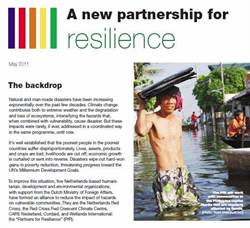
Working together on disasters, climate, ecosystems
-
Climate and disaster risks
-
Coastal resilience
-
Community resilience
-
Integrated delta management
Natural and man-made disasters have been increasing exponentially over the past few decades. Climate change contributes both to extreme weather and the degradation and loss of ecosystems, intensifying the hazards that, when combined with vulnerability, cause disaster. But these impacts were rarely, if ever, addressed in a coordinated way in the same programme, until now.
Climate change hits the poorest the hardest
It’s well established that the poorest people in the poorest countries suffer disproportionately. Lives, assets, products and crops are lost; livelihoods are cut off; economic growth is curtailed or sent into reverse. Disasters wipe out hard-won gains in poverty reduction, threatening progress toward the UN’s Millennium Development Goals.
To improve this situation, five Netherlands-based humanitarian, development and environmental organisations, have become the “Partners for Resilience” (PfR). During the coming 5 years, Wetlands International will work closely with Red Cross, Cordaid, Red Cross Climate Centre and CARE to implement a range of projects in Asia, Latin America and Africa to increase people’s resilience against (climate related) disasters via ecosystem restoration and management.

